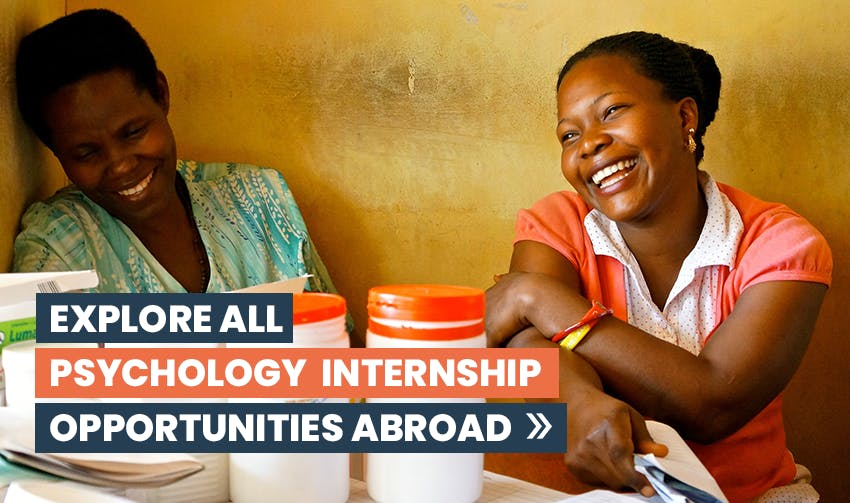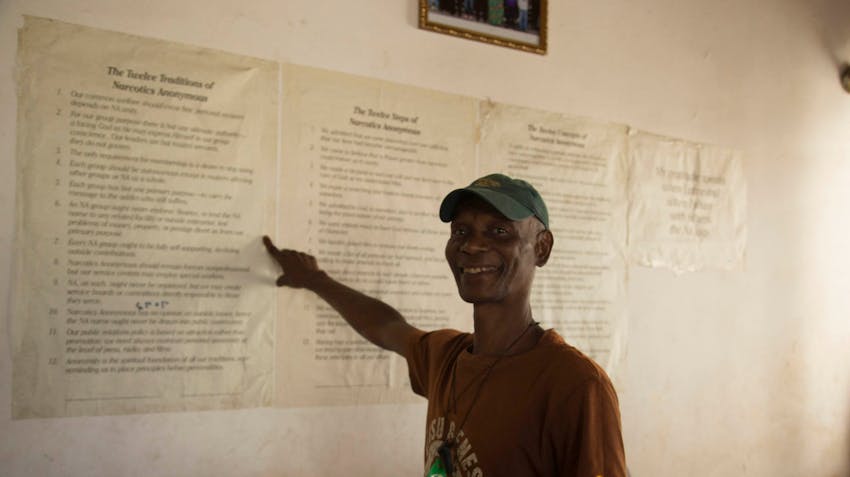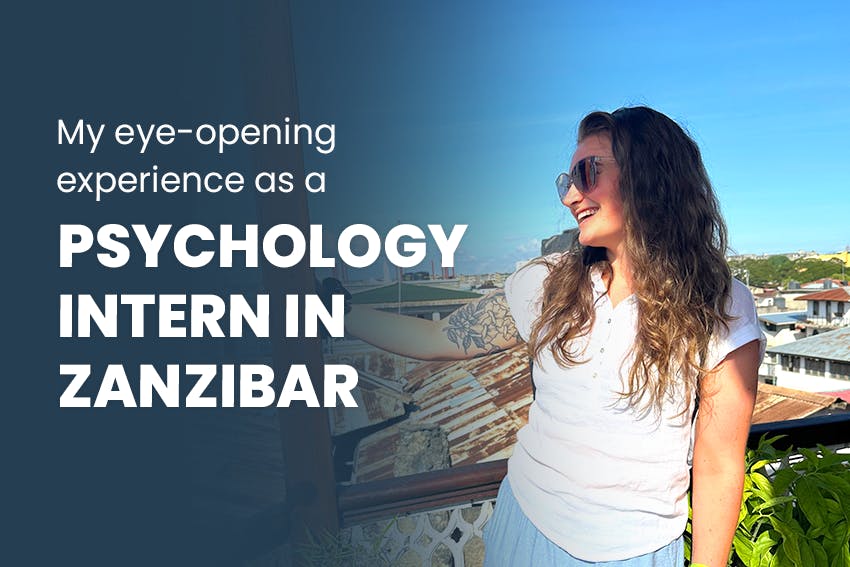
Psychology internships help students and young professionals to bridge their studies with their future career. Gain inspiration and insight from interns who have developed professional experience, formed new relationships, and built strong cultural competencies. Tessa Holsinger, from Liberty University, shares her eye-opening experience and perspective as a Psychology intern in Zanzibar, Tanzania.
Hi Tessa! How was your Psychology internship in Zanzibar?
The mental health hospital in which I was placed was an eye-opening experience. The hospital’s diverse wards cater to men, women, children, and individuals struggling with addiction, all requiring tailored care plans for effective recovery. Many of the local nurses were very young and attended to odd jobs around the hospital, such as bathing patients, changing sheets, cleaning wounds, etc.
As an intern, I played a vital role in conducting comprehensive patient assessments, managing medications, maintaining organized records, and contributing to personalized treatment strategies. I assisted individuals with stress management, self-esteem, and emotional and mental health issues. I collaborated with mental health professionals and other staff members to help perform clinical assessments or develop treatment plans. In addition, to modify treatment activities or approaches as needed to comply with client status changes. I also encouraged clients to express feelings and discuss life events to help develop insight into themselves or their relationships. Lastly, I helped to gather and research information about community mental health needs or resources used in conjunction with therapy.

How demanding was this internship? Did you have free time?
The time commitments at the mental health hospital were notably reasonable, typically concluding around midday. This respite allowed me to regain energy and focus for my other commitments and there was time during the week for Swahili language lessons (if you wish to do them).
This schedule also enabled me to allocate sufficient time to additional pursuits, so I could maximize opportunities presented by the local culture, in addition to excursions and leisure activities. Engaging in activities like the dolphin tour, spice tour, and snorkeling trips not only enriched my experience but also allowed me to strike a balance between the internship role and recreation. I loved every part of it. From swimming in caves to getting lost in local villages every part of this trip was amazing!
Upon returning to the intern accommodation, I enjoyed the luxury of having meals prepared for me, a welcome change from my regular routine at home!
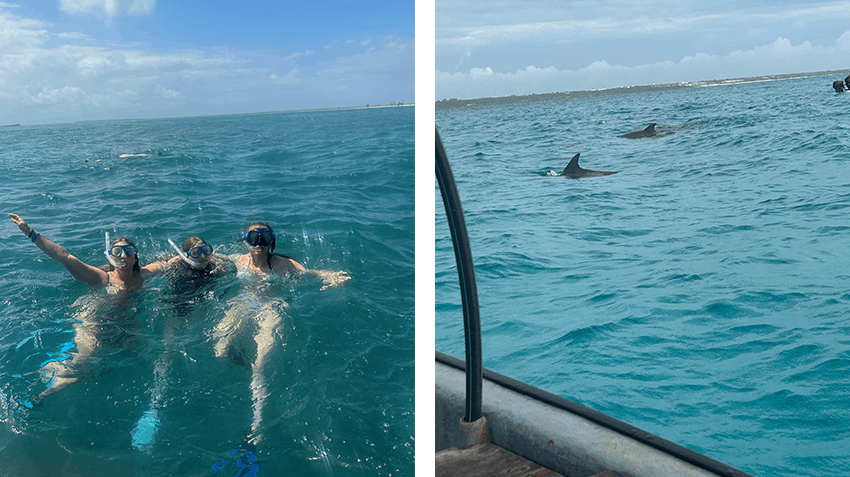
What did you learn from a different cultural perspective?
I had a profound and eye-opening experience related to cultural beliefs surrounding witches and their impact on mental health. In Zanzibar, I realized that there is often a serious stigma surrounding mental health. I learned that some people share the beliefs that mental ailments can come from dishonest living, in which their higher power is punishing them, or it could be due to curses.
For example, I noted how patients may express that mental ailments arise as a result of being cursed by witches in the community. Deep fear and anxiety can be expressed about the perceived influence of witchcraft on mental well-being. Such beliefs are deeply ingrained in the local culture and shape how people interpret and explain mental health problems.
On the whole, this was surprising to me, as it was a cultural perspective I had not encountered in my previous training and experiences. In my own cultural background, mental health issues are often attributed to various psychological, biological, or social factors, but belief in witchcraft as a cause was entirely new to me. I realized the significant impact that cultural beliefs can have on an individual’s perception of their mental health.
The experience had a profound impact on my perceptions as a psychology intern. It made me acutely aware of the importance of cultural competence and sensitivity in my work. It highlighted the need to approach mental health assessments and interventions with an understanding of the cultural context and beliefs of the individuals I work with.
My experience in Zanzibar also led me to question the intense focus on personal achievement that is often prevalent in my culture. In the United States, life can be fast-paced, stressful, and demanding, with a strong emphasis on career success and material possessions. However, during my time in Zanzibar, I encountered a different perspective. The locals frequently encouraged me to “be free,” and I observed that they tended to lead more relaxed lives, appreciating and savoring each moment as it came.
While personal growth and ambition are important, I learned that it’s equally crucial to find joy in the simplicity of life, cherish moments with loved ones, and prioritize overall well-being and contentment. This shift in perspective has prompted me to reevaluate my priorities and consider how I can incorporate more of this “be free” mindset into my own lifestyle.
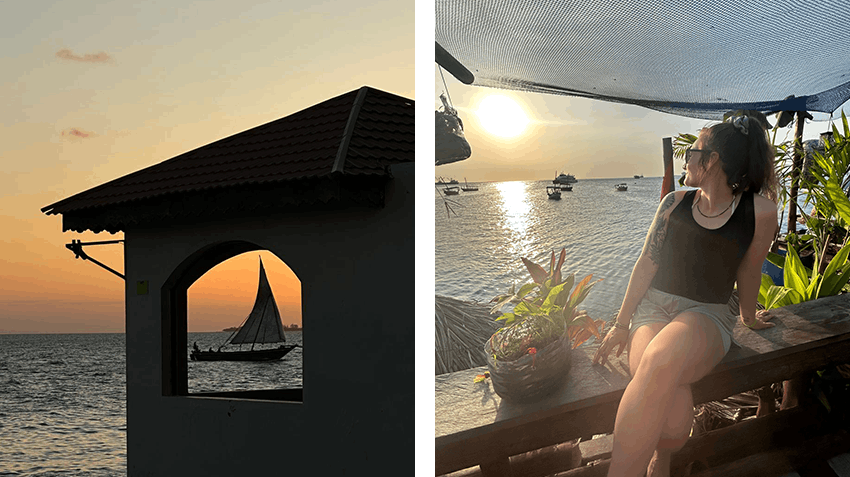
How did this internship help you to learn new skills?
Opting for this particular program was driven by my eagerness to immerse myself in a new culture, embrace varied healthcare practices, and learn how to deliver therapeutic interventions under resource constraints.
This experience has equipped me with a wide array of skills, including adept communication, precise patient evaluation, formulation of effective treatment protocols, and a deepened understanding of the intricacies of mental health issues. Practically, reading and evaluating charts will assist me in my future career path as I will need to be able to read and understand patient files.
I’ve garnered profound insights into the impact of severe mental illnesses on individuals’ quality of life. This experience has instilled in me a heightened sensitivity towards the challenges faced by individuals with mental illnesses and honed my ability to contribute effectively to their well-being.
In essence, my internship not only expanded my clinical skill set but also broadened my cultural horizons and deepened my compassion for those grappling with mental health concerns. These invaluable lessons and capabilities are what I bring to the table as a prospective member of your team. It will also enable me to complete my undergraduate degree in psychology.
Among my notable achievements during this internship, I take great pride in mastering elements of the local language, which allowed me to engage more actively in the treatment process and connect with patients on a more meaningful level.
Was your internship impacted by a language barrier?
In Zanzibar, everyone speaks Swahili, while I am fluent in English. Initially, this language difference made me feel somewhat useless, as effective communication is crucial for success in any work environment. However, I was determined to devise a plan to overcome this challenge and adapt to the situation. I took a proactive approach and developed a plan to address the language barrier.
For example, I began picking up Swahili words, which showed my willingness to learn and embrace the local culture. Learning key phrases and common expressions significantly helped bridge the communication gap and made me feel more integrated into the team. In addition to learning Swahili, I read documents written in English to ensure I grasped essential information and context related to my work.
This kept me informed and allowed me to actively engage in projects, despite the predominant use of Swahili in the environment. Furthermore, I sought assistance from my colleagues to translate conversations and information. By doing so, I demonstrated my commitment to overcoming the language barrier and actively engaging with my peers.
For future interns, I highly recommend taking time to learn some Swahili. You cannot make meaningful relationships with patients if you cannot understand them. My own dedication to learning the Swahili language significantly improved my ability to communicate effectively with locals.
-
Use Simple Language and Speak Clearly: When there is a language barrier, it is helpful to use simple, straightforward language and avoid complex jargon or slang. Speak clearly, enunciate words, and maintain a moderate pace to enhance comprehension.
-
Be Patient and Respectful: Recognize that communication across cultures may take more time and effort. Be patient and respectful, allowing the person to express themselves at their own pace. Avoid interrupting or finishing their sentences, as it may hinder their ability to communicate effectively.
-
Use Non-Verbal Communication: Non-verbal cues can play a vital role in cross-cultural communication. Pay attention to facial expressions, gestures, and body language. Use these cues to infer meaning and establish rapport. However, be aware that non-verbal cues can also vary across cultures, so be open to learning and adapting.
-
Seek Clarification: If something is unclear, don’t hesitate to ask for clarification politely. Use open-ended questions to encourage the person to provide additional details or explanations. This demonstrates your genuine interest in understanding their perspective.
-
Be Culturally Sensitive: Cultural differences can significantly impact communication styles. Be aware of cultural norms, customs, and values to avoid misunderstandings or unintentionally offending someone. Show respect for their cultural practices and perspectives.
-
Practice Empathy and Open-Mindedness: Cultivate an attitude of empathy and open-mindedness. Be willing to learn from the other person’s cultural background and adapt your communication style accordingly. Embrace differences and approach the interaction with a willingness to bridge cultural gaps.

What other tips would you share with future interns?
-
Embrace Cultural Diversity: Embrace the opportunity to work with people from diverse cultural backgrounds. Approach the experience with an open mind and a willingness to learn from different perspectives, beliefs, and practices. Appreciating diversity will enhance your understanding of different cultures and contribute to your personal and professional growth.
-
Be Respectful and Sensitive: Show respect for cultural differences and be sensitive to the customs, norms, and values of others. Be mindful of potential cultural misunderstandings and avoid making assumptions or generalizations based on stereotypes. Treat everyone with dignity and foster an inclusive environment.
-
Cultivate Cultural Competence: Take the initiative to learn about the cultures represented in your workplace. Educate yourself on cultural practices, traditions, and communication styles. Engage in conversations, ask questions, and listen attentively to gain a deeper understanding of others’ experiences. Developing cultural competence will enhance your ability to work effectively in a diverse setting.
-
Practice Active Listening: Actively listen to your colleagues and supervisors, paying attention to their perspectives and experiences. Seek to understand their viewpoints without judgment or bias. By listening attentively, you can foster better relationships and contribute meaningfully to your team.
-
Be Flexible and Adaptable: Culturally diverse settings may present different ways of doing things. Be open to new approaches, ideas, and methods. Adapt to different working styles, communication norms, and problem-solving strategies. Demonstrating flexibility and adaptability will help you navigate diverse work environments more effectively.
-
Build Relationships: Take the initiative to build relationships with your colleagues from different cultural backgrounds. Engage in conversations, share experiences, and find common ground. Building relationships will foster a sense of camaraderie and mutual support, contributing to a positive and inclusive work environment.
-
Seek Feedback and Learn from Mistakes: Be proactive in seeking feedback on your performance. Embrace constructive criticism and learn from any mistakes or misunderstandings that may arise. View them as opportunities for growth and development. Taking the initiative to improve and learn from your experiences will contribute to your professional development.
-
Network and Learn from Others: Actively engage in networking opportunities within your workplace. Connect with colleagues from diverse backgrounds, participate in cultural events or celebrations, and join relevant professional organizations or groups. Networking will broaden your understanding of different cultures and create opportunities for collaboration and learning.
Remember, cultural diversity brings a wealth of knowledge and experiences to the workplace. Embrace the chance to learn, grow, and expand your cultural awareness during your internship. By approaching the experience with an open mind and a willingness to connect, you can make a meaningful impact and develop valuable skills that will benefit you throughout your career!
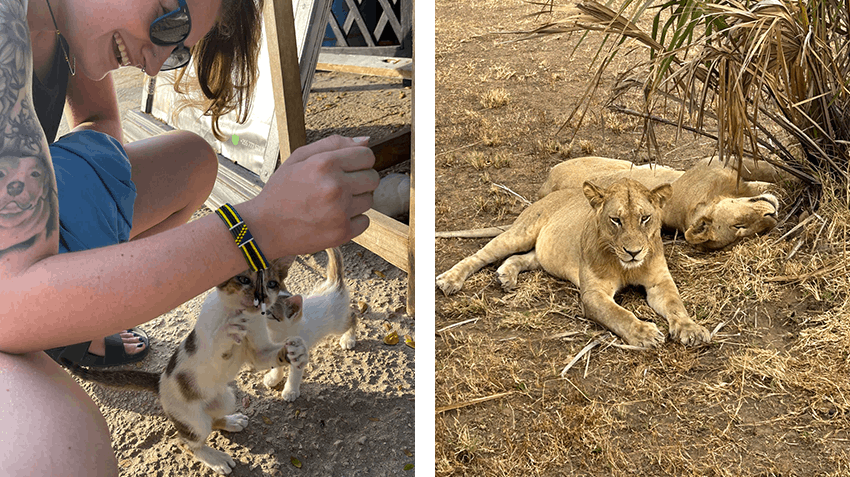
Ready to start planning your own internship?
- Check out our amazing range of psychology internship opportunities and submit your interest via our online application form (for free).
- We’ll review your application to confirm you’re a good match for your chosen internship program and that there is availability for the dates you’ve requested. We can then accept you into the program.
- Once you’re accepted, you can reserve your place by paying a deposit of $499 USD. This confirmation allows us to reserve your desired internship dates while we arrange your placement and customize your internship. Then let the adventure begin!
